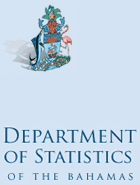NASSAU, BAHAMAS — The adverse effects of the COVID-19 pandemic resulted in a 25 percent contraction in the gross domestic product (GDP) for New Providence, which alone accounted for nearly 75 percent of the country’s $9.9 billion output.
The National Accounts Section of the Department of Statistics, in its first-ever GDP report outlining an island-by-island performance covering the years 2015 to 2020, noted that of the 2020 GDP of $9.908 billion in nominal (current) dollars, New Providence (NP) represented $7.422 billion (74.9 percent); Grand Bahama, $1.437 billion (14.5 percent); and the Family Islands the remaining $1.048 billion (10.6 percent).
 A disaggregation of the Family Island share of 2020 GDP contributions revealed that Eleuthera contributed $269 million (2.7 percent); Abaco, $243 million (2.5 percent); Exuma, $137 million (1.4 percent); Andros, $107 million (1.1 percent); Long Island, $74 million (0.7 percent); Mayaguana, Acklins, Crooked Island and Inagua, $103 million (one percent); Bimini and the Berry Islands, $47 million (0.5 percent); Cat Island, San Salvador and Rum Cay, $35 million (0.4 percent); and the remaining Family Islands, $34 million (0.3 percent).
A disaggregation of the Family Island share of 2020 GDP contributions revealed that Eleuthera contributed $269 million (2.7 percent); Abaco, $243 million (2.5 percent); Exuma, $137 million (1.4 percent); Andros, $107 million (1.1 percent); Long Island, $74 million (0.7 percent); Mayaguana, Acklins, Crooked Island and Inagua, $103 million (one percent); Bimini and the Berry Islands, $47 million (0.5 percent); Cat Island, San Salvador and Rum Cay, $35 million (0.4 percent); and the remaining Family Islands, $34 million (0.3 percent).
“The 2015 to 2020 annual GDP trends for New Providence revealed gains in its percentage contribution to overall output for The Bahamas — with the share moving from 70 percent in 2015 to 75 percent in 2020,” the Department of Statistics noted.
“As the main center of domestic economic activity, the adverse effects of the COVID-19 pandemic was most evident in the 25 percent contraction posted in GDP for 2020. Consistent with the high concentration of tourism activity in New Providence, which includes Paradise Island, the contraction was most evident in the accommodation and food services sector.”
Pointing to Grand Bahama, the Department of Statistics noted: “Grand Bahama’s GDP for the review period revealed a decline in its contribution to the total GDP of The Bahamas — moving from a high of 17 percent in 2015 to a low of 15 percent in 2020.
“Underlying these developments was a series of events that impacted the Grand Bahamian economy, commencing with the adverse impact of Hurricane Irma in 2017.
“The economy rebounded from this devastation in 2018, and recorded a modest falloff in 2019 — as growth in the first eight months was tempered by the impact of Hurricane Dorian on the Eastern and parts of Central Grand Bahama.
“The contraction in 2020 was associated with the COVID-19 pandemic, combined with a temporary halt in the hurricane rebuilding efforts.”






